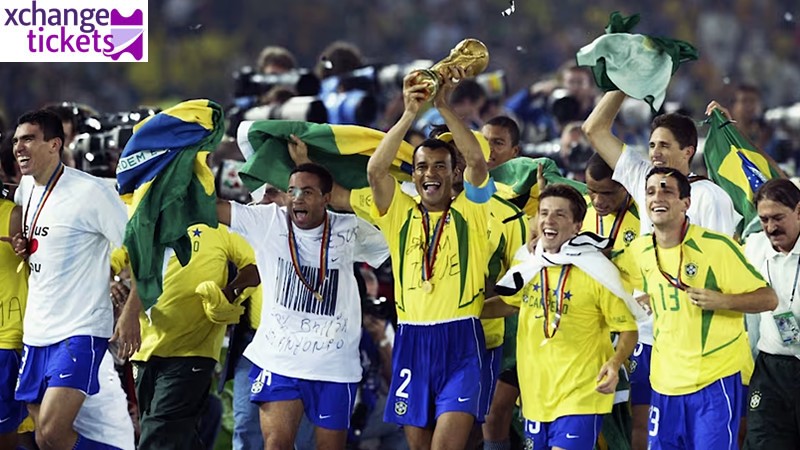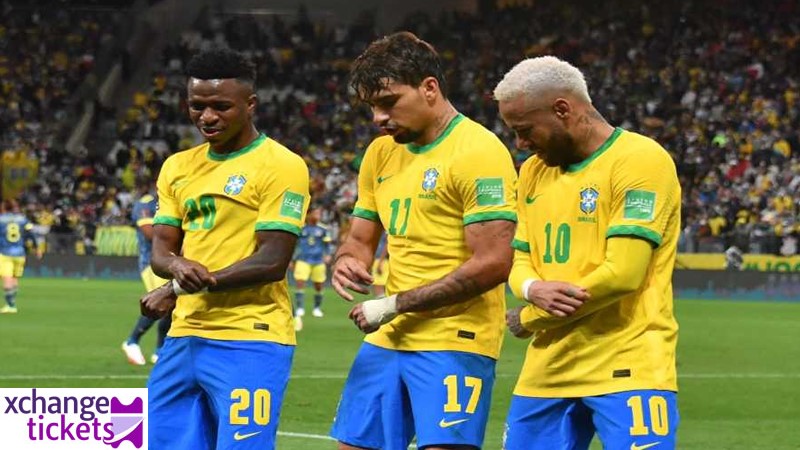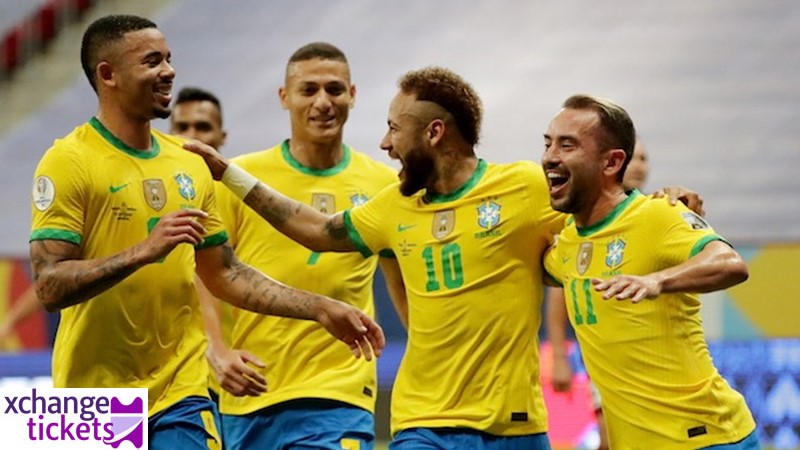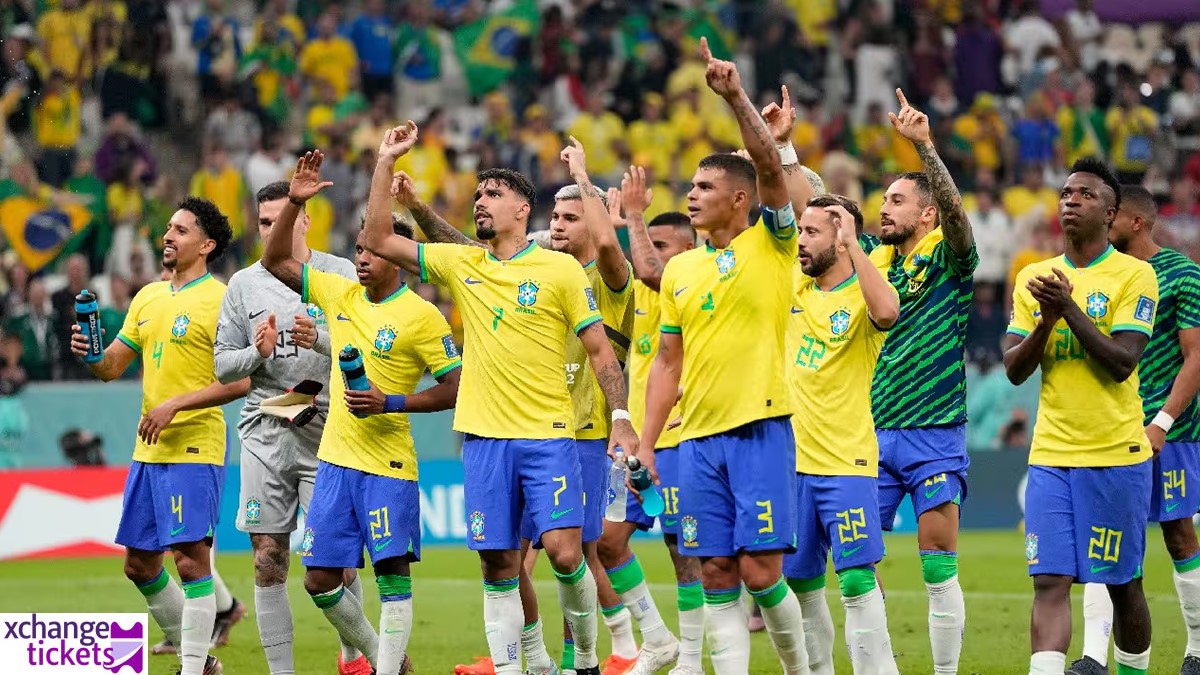FIFA World Cup:Ever wondered why Brazil consistently produces some of the greatest footballers in history? From Pelé and Ronaldinho to Neymar, Brazil’s football legacy is unmatched, with a record five World Cup titles to prove it. Known as The Beautiful Game, football is more than just a sport in Brazil—it’s a way of life.
Football fans worldwide are invited to secure their Football World Cup 2026 spot through our trusted online platform, Xchangetickets.com. Don’t miss the chance to witness the world’s best teams compete for the ultimate football glory in this historic tournament. Fans can easily book their FIFA World Cup 2026 Tickets on our website and enjoy exclusive discounted prices. Be part of the excitement and experience the thrill of football live—reserve your tickets today!

The country’s dominance on the global stage isn’t just down to natural talent. It stems from a deep-rooted culture, passionate street play, and a nationwide love for the game. In this article, we explore the key reasons behind Brazil’s remarkable and consistent footballing success.
FIFA World Cup: From British roots to Brazilian Innovation
Brazil’s football journey began in the late 19th century, brought over by British immigrants. Initially embraced by the upper-class Brazilians of European descent, the early game mirrored the structured, disciplined style seen in Europe. But the true transformation took place far from the elite clubs in the poorer, Afro-Brazilian communities.
Lacking formal facilities, these communities developed a more instinctive and creative approach to the game. In cramped urban spaces, on beaches, and in dusty neighbourhoods, players honed close control, agility, and improvisation skills born out of necessity. It was a raw, expressive style, deeply influenced by music, dance, and cultural rhythms, which would shape Brazil’s iconic footballing identity.
This street-born tradition remains strong today. Forms like futevôlei (foot-volleyball) and futsal (indoor football) are still widely played and continue to nurture the technical brilliance and flair that define Brazilian football. These environments encourage improvisation, fast decision-making, and an artistry that sets Brazilian players apart on the world stage.
Football World Cup: The commercial tide: Europe comes calling
As the 20th century unfolded, football’s popularity in Brazil surged. By 1950, the once-separate football cultures of the structured European-style clubs and the dynamic, street-driven game began to blend, forging a powerful and uniquely Brazilian football identity. The national team, known as the Seleção, rose to prominence, combining tactical intelligence with dazzling individual flair.
Experience the excitement of the FIFA World Cup 2026 live from the heart of the action! Don’t miss your chance to witness the world’s top football teams and players compete for global glory on the sport’s biggest stage. Secure your Football World Cup 2026 Tickets and be part of the electrifying atmosphere that only this legendary tournament can offer.
Although they suffered heartbreak in the 1950 World Cup final on home soil, that defeat became a catalyst. Propelling them to their first World Cup victory in 1958, led by the then-17-year-old Pelé. The 1970s and 80s marked another significant shift. European football grew more commercialised, with clubs gaining immense financial muscle.
This triggered a wave of Brazilian players heading to Europe, lured by better salaries, world-class facilities, and the prestige of top-tier leagues. Stars like Zico and Falcão led the way, and by the 1990s, the trend intensified many Brazilian internationals were now based abroad. This mass migration had a lasting impact.

Europe offered a better standard of living, becoming a major motivator for young Brazilian talent. Domestic clubs began focusing heavily on youth development, turning academies into talent pipelines. Unlike earlier generations who moved in their late twenties, players like Ronaldo were transferred to Europe as teenagers.
FIFA World Cup 2026: A vast population and a vibrant footballing culture
While many nations have tried to replicate Brazil’s footballing success, several core factors give Brazil a distinct edge in consistently producing world-class players well into the 21st century. One of the most important is its massive population. In 1950, Brazil’s population was roughly on par with the UK’s; today it exceeds it by nearly 150 million.
This larger population naturally increases the chances of discovering exceptional talent. However, it’s not just about numbers. Brazil’s deeply imbedded football culture plays an energetic role. Street football remains widespread, especially in less privileged areas, where it continues to shape technically gifted, creative players.
Football is more than just a sport, it’s part of the national identity. Embraced across all social classes, from the favelas to the wealthiest neighborhoods. This cultural immersion fuels an intense passion for the game, driving young players to hone their skills from an early age and pushing them to reach the highest levels.
The modern age: Brazil continues to dominate the football world
Despite the globalisation of football and the emergence of new footballing giants, Brazil remains a powerhouse, consistently producing world-class talent. From the iconic flair of Zico and Socrates in the 1980s to the explosive brilliance of Neymar and Vinícius Júnior today. Brazilian players continue to leave their mark on the world stage.

Their enduring success is no accident, it’s the product of a unique combination of factors. A rich footballing heritage, a thriving street culture, a vast population, and an unyielding national obsession with the game. What sets Brazil apart is how deeply football is woven into its social and cultural fabric.
FIFA World Cup: In the favelas and cities alike, children grow up playing the game in alleys, beaches, and makeshift pitches, developing creativity, flair, and technical prowess from a young age. This grassroots foundation, coupled with world-class youth academies and growing international exposure, helps mould raw talent into global stars.
Brazil’s ability to evolve with the modern game while staying true to its expressive style has kept it at the forefront of international football. With young stars like Endrick rising fast, Brazil’s footballing rhythm, the iconic samba style, shows no signs of slowing down. The future looks promising for the world’s most celebrated footballing nation.
We are offering FIFA 2026 Tickets. Football admirers can get World Cup Tickets through our trusted online ticketing marketplace. Xchangetickets.com is the most reliable source for booking FIFA World Cup 2026 Tickets. Sign up for the latest Ticket alert. Don’t miss out on the chance to be at the heart of football history. Grab your tickets now and be there for the ultimate showdown.

Leave a Reply